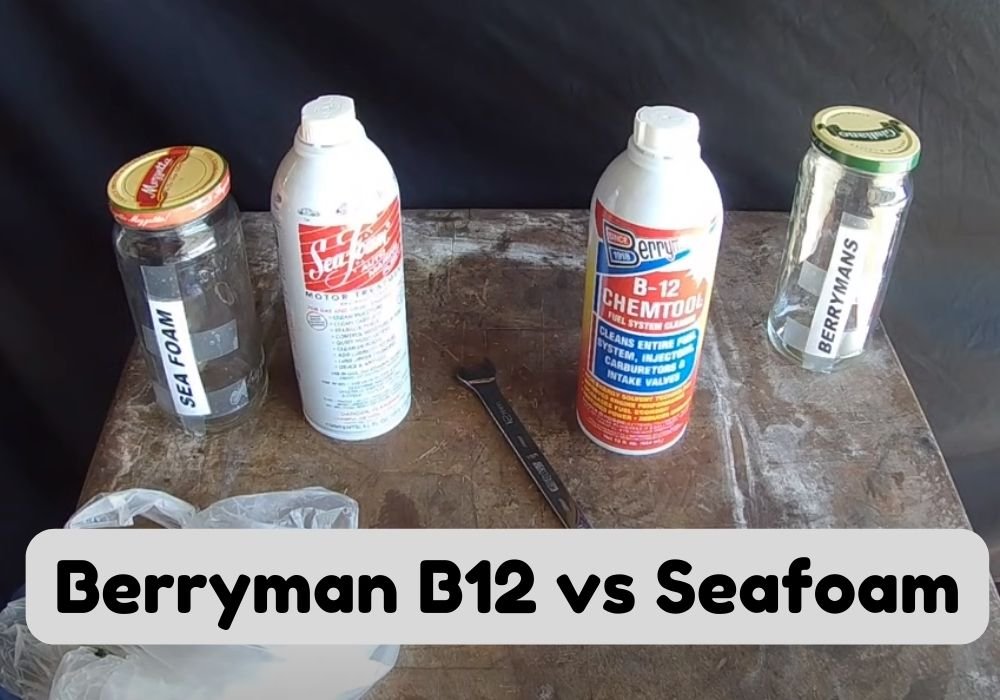In today’s fast-paced world, where we rely heavily on our vehicles for daily commutes and adventures, the importance of maintaining a healthy fuel system cannot be overstated. Fuel additives have emerged as indispensable tools for keeping your engine running smoothly and efficiently. In this blog post, we’ll delve into the world of fuel additives and compare two well-known options: Berryman B12 and Seafoam.
Contents
The Significance of Fuel Additives
Fuel additives are specially formulated chemical compounds designed to enhance the performance and longevity of your vehicle’s engine. They offer a wide range of benefits, from cleaning critical engine components to reducing carbon buildup and improving fuel efficiency. As vehicles age and encounter various environmental factors, they can accumulate deposits and face fuel-related issues that hinder their performance. Fuel additives come to the rescue by addressing these problems and maintaining the engine’s optimal operation.
Introducing Berryman B12 and Seafoam
In our quest to find the most effective fuel additives on the market, two prominent contenders have consistently garnered attention: Berryman B12 and Seafoam. Both of these additives have a reputation for tackling common engine problems and revitalizing fuel systems, but they do so in slightly different ways.
Berryman B12 is a trusted name in the automotive industry, known for its potent cleaning properties. It is designed to rid your fuel system of stubborn carbon deposits and contaminants that can rob your vehicle of performance and fuel efficiency.
On the other hand, Seafoam has gained a dedicated following for its unique approach to engine maintenance. It not only cleans deposits but also provides lubrication to essential engine parts and helps stabilize fuel, making it a versatile option for those seeking comprehensive care for their vehicles.
Preview of the Comparison
In this blog post, we will take a closer look at both Berryman B12 and Seafoam, dissecting their pros and cons, analyzing their performance, considering their costs, and evaluating their ease of use. By the end of this comparison, you’ll have a clearer understanding of which fuel additive might be the right choice for your specific needs and vehicle type. So, let’s dive in and explore the world of Berryman B12 vs. Seafoam to help you make an informed decision and keep your vehicle running at its best.
Understanding Fuel Additives
What are Fuel Additives?
Fuel additives are chemical compounds specifically formulated to improve the performance and efficiency of an engine by enhancing the properties of the fuel it uses. These additives are mixed with gasoline or diesel fuel to address various issues related to combustion, emissions, and engine cleanliness.
Fuel additives can take on different roles depending on their composition and purpose. Some common types of fuel additives include:
- Fuel System Cleaners: These additives are designed to clean the fuel system components, such as fuel injectors, intake valves, and combustion chambers, by removing carbon deposits, varnish, and other contaminants. This helps maintain optimal fuel flow and combustion efficiency.
- Octane Boosters: Octane boosters increase the octane rating of gasoline, reducing the risk of engine knocking or pinging. They are particularly useful in high-performance engines or when using lower-octane fuels.
- Cetane Boosters: Cetane boosters are used in diesel fuels to improve ignition quality and combustion, leading to better engine performance, reduced emissions, and smoother operation.
- Fuel Stabilizers: Fuel stabilizers prevent the degradation of gasoline or diesel fuel over time. They are especially useful for vehicles and equipment that sit idle for extended periods, such as seasonal vehicles and generators.
- Lubricity Additives: Lubricity additives enhance the lubricating properties of diesel fuel, reducing wear and tear on fuel system components like fuel pumps and injectors.
Why Should You Use Fuel Additives?
The use of fuel additives can offer several benefits to vehicle owners:
- Improved Performance: Fuel additives can enhance combustion, leading to improved engine performance, increased power output, and smoother operation.
- Fuel Efficiency: By keeping fuel system components clean and optimizing combustion, additives can improve fuel efficiency, potentially saving you money at the pump.
- Emissions Reduction: Cleaner combustion can lead to lower emissions of harmful pollutants, contributing to a greener and more environmentally friendly vehicle.
- Maintenance: Fuel additives can help prevent and mitigate common issues such as carbon buildup, knocking, and fuel system clogs, reducing the need for costly repairs and maintenance.
- Longevity: The use of additives can extend the life of your vehicle’s engine by reducing wear and tear on critical components.
Common Problems Fuel Additives Address
Fuel additives are designed to address a range of common problems that vehicles encounter over time, including:
- Carbon Deposits: Carbon deposits can accumulate on intake valves, fuel injectors, and combustion chambers, leading to reduced engine performance, rough idling, and decreased fuel efficiency.
- Fuel System Contaminants: Contaminants such as water, dirt, and debris can find their way into the fuel system, causing clogs and corrosion.
- Knocking and Pinging: Engines may experience knocking or pinging due to low-quality fuel or carbon buildup, which can be alleviated with the use of additives.
- Stale Fuel: Fuel that has been sitting for an extended period can degrade and lead to starting problems and poor engine performance.
Berryman B12: The Pros and Cons
Description of Berryman B12
Berryman B12 is a well-established and respected fuel system cleaner and additive that has been a staple in the automotive industry for decades. It is formulated to address common fuel system issues and improve engine performance. Here’s a closer look at what Berryman B12 offers:
- Powerful Cleaning: Berryman B12 is renowned for its potent cleaning properties. It is designed to break down and remove stubborn carbon deposits, varnish, and other contaminants that can accumulate in fuel injectors, intake valves, and combustion chambers.
- Injector Cleaning: One of Berryman B12’s primary strengths is its ability to clean fuel injectors thoroughly. Clean injectors ensure a consistent and precise fuel spray, leading to better combustion and improved fuel efficiency.
- Carbon Buildup Removal: Carbon buildup on intake valves and combustion chambers can reduce engine efficiency and power. Berryman B12 helps remove this buildup, restoring optimal engine performance.
- Fuel Stabilization: Berryman B12 contains fuel stabilizers, which help prevent fuel from deteriorating over time. This is particularly useful for vehicles and equipment that sit unused for extended periods.
Benefits of Using Berryman B12
Using Berryman B12 as a fuel additive can provide several advantages:
- Improved Fuel Efficiency: By cleaning fuel system components and promoting better combustion, Berryman B12 can lead to increased fuel efficiency, potentially saving you money on fuel costs.
- Enhanced Engine Performance: With cleaner injectors and reduced carbon deposits, your engine can operate more smoothly and produce better power and acceleration.
- Reduced Emissions: A cleaner fuel system results in more efficient combustion, which can lead to reduced emissions of harmful pollutants.
Potential Drawbacks of Berryman B12
While Berryman B12 offers numerous benefits, it’s essential to be aware of potential drawbacks:
- Cost: High-quality fuel additives like Berryman B12 can be relatively expensive compared to other options on the market. However, many users find the performance gains to be worth the investment.
- Compatibility: While Berryman B12 is compatible with most vehicles, some older or specialized engines may respond differently to this particular additive. It’s crucial to check compatibility with your specific vehicle.
Seafoam: The Pros and Cons
Description of Seafoam
Seafoam is a versatile and widely recognized fuel additive that has earned a dedicated following among vehicle enthusiasts and mechanics. It is known for its unique approach to engine maintenance, offering a range of benefits beyond simple fuel system cleaning. Let’s take a closer look at what Seafoam brings to the table:
- Cleaning and Lubrication: Seafoam is designed to clean various engine components, including fuel injectors, carburetors, intake valves, and combustion chambers. Additionally, it provides lubrication to critical engine parts, such as piston rings and cylinder walls.
- Stabilizing Fuel: Seafoam can help stabilize fuel by preventing it from breaking down over time, which is particularly useful for vehicles that sit unused for extended periods.
Benefits of Using Seafoam
Using Seafoam as a fuel additive offers several notable advantages:
- Comprehensive Cleaning: Seafoam’s cleaning properties cover a wide range of engine components, not just the fuel system. This can lead to improved engine performance and reduced carbon buildup.
- Lubrication: Seafoam’s ability to provide lubrication to essential engine parts can help reduce friction and wear, potentially extending the life of your engine.
- Fuel Stabilization: Seafoam helps prevent fuel from becoming stale or deteriorating over time, making it an excellent choice for seasonal vehicles or equipment.
Potential Drawbacks of Seafoam
Despite its popularity, Seafoam is not without its limitations:
- Limited Cleaning Power: While Seafoam offers comprehensive cleaning, it may not be as effective as specialized fuel system cleaners like Berryman B12 in removing extremely stubborn carbon deposits.
- May Not Work Well in Some Older Engines: Seafoam may produce different results in older or heavily worn engines, which may require more aggressive cleaning agents.
Head-to-Head Comparison
we’ll conduct a comprehensive comparison of Berryman B12 and Seafoam, taking into account various factors that can influence your decision when choosing a fuel additive. To help you visualize the comparison, we’ve created a table summarizing key aspects of both products.
| Aspect | Berryman B12 | Seafoam |
| Cleaning Power | Potent cleaning properties; effective at removing carbon deposits, varnish, and contaminants from fuel system components. | Comprehensive cleaning; cleans fuel injectors, carburetors, intake valves, and combustion chambers, as well as providing lubrication. |
| Performance Improvement | Improved engine performance; smoother operation, increased power, and better acceleration. | Enhanced engine performance; cleaner combustion, reduced carbon buildup, and reduced friction for improved efficiency. |
| Fuel Efficiency | Improves fuel efficiency by optimizing combustion and maintaining clean fuel system components. | Aids in fuel efficiency by promoting efficient combustion and reducing friction in the engine. |
| Emissions Reduction | Reduces emissions of harmful pollutants due to improved combustion efficiency. | Contributes to reduced emissions by promoting cleaner combustion. |
| Fuel Stabilization | Contains fuel stabilizers to prevent fuel deterioration over time, making it suitable for seasonal vehicles. | Prevents fuel breakdown and is useful for maintaining fuel quality during storage. |
| Lubrication | Primarily focused on cleaning; does not provide lubrication to engine components. | Provides lubrication to critical engine parts, reducing friction and wear. |
| Cost | Relatively high cost compared to some other fuel additives. | Generally competitively priced among fuel additives. |
| Ease of Use | Easy to use; simply add to the fuel tank. | User-friendly; can be added directly to the fuel tank or introduced via vacuum lines and intake. |
| Customer Reviews | Generally positive reviews for its cleaning capabilities and performance improvement. | Highly regarded for its comprehensive cleaning and lubrication, with a strong following among enthusiasts. |
| Compatibility | Compatible with most vehicles; some older or specialized engines may not respond as well. | Compatible with a wide range of vehicles and engine types; versatile in application. |
As you can see from the comparison table, both Berryman B12 and Seafoam offer unique benefits. Berryman B12 is known for its powerful cleaning properties and effectiveness in addressing carbon deposits. It excels at improving fuel efficiency and reducing emissions. On the other hand, Seafoam offers a comprehensive approach to cleaning and lubricating various engine components, making it a versatile choice. It is also well-regarded for stabilizing fuel quality and reducing friction.
Ultimately, the choice between Berryman B12 and Seafoam depends on your specific needs and your vehicle’s requirements. Consider factors such as the severity of carbon buildup, the desired level of lubrication, and your budget when making your decision.
How to Choose the Right Fuel Additive for Your Vehicle
Choosing the right fuel additive for your vehicle can significantly impact its performance, fuel efficiency, and longevity. To make an informed decision, consider the following factors and scenarios:
Vehicle Age and Condition
- Newer Vehicles: If you own a relatively new vehicle with a well-maintained fuel system, a general fuel additive like Seafoam may be sufficient. It will help keep your engine clean lubricated, and prevent fuel degradation.
- Older Vehicles: Older vehicles may benefit from a more aggressive cleaning agent like Berryman B12, especially if they have significant carbon buildup or performance issues.
- High Mileage: If your vehicle has high mileage, it’s more likely to have accumulated carbon deposits. Consider a fuel additive with strong cleaning properties to address this issue.
Specific Issues You Want to Address
- Carbon Deposits: If you’ve noticed decreased engine performance, rough idling, or reduced fuel efficiency, you should prioritize a fuel additive known for its carbon deposit removal capabilities, such as Berryman B12.
- Lubrication: If you’re concerned about reducing engine wear and friction, particularly in high-mileage or older vehicles, a product like Seafoam, which provides lubrication, maybe a better choice.
Budget Considerations
- Cost-Effective Options: If you’re on a tight budget, there are more affordable fuel additives available. While they may not offer the same level of performance as Berryman B12 or Seafoam, they can still provide some benefits.
Compatibility with Your Vehicle’s Fuel System
- Check Compatibility: Before using any fuel additive, ensure it is compatible with your vehicle’s engine and fuel system. Consult your vehicle’s manual or contact the manufacturer if you need more clarification.
Fuel Type
- Gasoline vs. Diesel: Some fuel additives are specifically designed for gasoline engines, while others are intended for diesel engines. Be sure to choose the right type for your vehicle.
Environmental Considerations
- Emissions Reduction: If reducing emissions is a priority for you, consider a fuel additive that explicitly mentions emissions reduction in its benefits.
Seasonal or Infrequent Use
- Storing Vehicles: If you have seasonal vehicles or equipment that sit unused for extended periods, opt for a fuel stabilizer like Seafoam or a product with fuel-stabilizing properties.
User Experience and Recommendations
- Customer Reviews: Take into account user reviews and recommendations for specific fuel additives. Look for products with a positive track record and satisfied customers.
- Mechanic Advice: If you need clarification on which fuel additive to use, consult with a trusted mechanic or automotive expert for personalized recommendations.
Conclusion
In the world of automotive maintenance, the choice of the right fuel additive can have a profound impact on your vehicle’s performance, fuel efficiency, and overall longevity. Both Berryman B12 and Seafoam have earned their stripes as trusted options for improving engine health, but which one is the best fit for your needs? Let’s recap the key points and offer some final guidance to help you make an informed decision.
Berryman B12 stands out for its:
- Potent cleaning properties that effectively tackle carbon deposits, varnish, and contaminants in your fuel system.
- Track record of enhancing fuel efficiency, resulting in savings at the pump.
- Proven ability to reduce emissions by improving combustion efficiency.
However, it’s worth noting that Berryman B12 can be relatively expensive compared to some other fuel additives, and its compatibility with certain older or specialized engines may vary.
Seafoam, on the other hand, boasts:
- Comprehensive cleaning capabilities, reaching not only the fuel system but also various engine components like intake valves and combustion chambers.
- Lubrication properties that reduce friction and wear in critical engine parts.
- Fuel stabilization prevents fuel deterioration over time, making it ideal for seasonal vehicles.
While Seafoam is generally competitively priced among fuel additives and compatible with a wide range of vehicles, it may not be as effective as Berryman B12 in addressing extremely stubborn carbon deposits.
In your decision-making process, consider the age and condition of your vehicle, the specific issues you want to address, your budget, and compatibility with your vehicle’s fuel system. The right choice may also depend on your environmental concerns, as some additives emphasize emissions reduction.
Ultimately, both Berryman B12 and Seafoam have their strengths and weaknesses, making them suitable for different scenarios and preferences. Regardless of your choice, regularly incorporating a high-quality fuel additive into your vehicle’s maintenance routine can lead to improved performance, fuel efficiency, and a longer lifespan for your engine.
Remember that before using any fuel additive, it’s essential to read and follow the manufacturer’s instructions and consider consulting with a trusted mechanic or automotive expert for personalized advice. Making a well-informed decision when selecting a fuel additive will contribute to the continued smooth operation of your vehicle, ensuring that it serves you reliably on all your journeys.
Some frequently asked questions.
What is the purpose of a fuel additive?
A fuel additive is designed to enhance the properties of the fuel used in vehicles or equipment. It can serve various purposes, including cleaning fuel system components, improving combustion efficiency, stabilizing fuel quality, reducing emissions, and reducing engine wear.
How often should I use a fuel additive?
The frequency of using a fuel additive depends on several factors, including the type of additive, your vehicle’s age and condition, and your driving habits. Many people use fuel additives every 3,000 to 5,000 miles or as recommended by the manufacturer. Seasonal or infrequently used vehicles may benefit from additives before storage.
Are fuel additives safe for all vehicles?
Most fuel additives are safe for use in a wide range of vehicles, including cars, trucks, motorcycles, and boats. However, it’s essential to check the manufacturer’s recommendations and your vehicle’s compatibility before using any additive, especially in older or specialized engines.
Do fuel additives improve fuel efficiency?
Yes, many fuel additives can improve fuel efficiency by cleaning fuel system components, optimizing combustion, and reducing carbon deposits. However, the extent of improvement may vary depending on the specific additive and your vehicle’s condition.
Can fuel additives harm my engine?
When used as directed and in the recommended dosage, fuel additives are generally safe for engines. However, overuse or using the wrong type of additive can potentially cause harm. It’s crucial to follow the manufacturer’s instructions and choose an additive suitable for your vehicle.
Do fuel additives work with both gasoline and diesel engines?
Some fuel additives are designed for gasoline engines, while others are formulated specifically for diesel engines. It’s important to select the appropriate type of additive for your vehicle’s fuel system to ensure compatibility and effectiveness.
Can fuel additives fix engine problems like knocking or pinging?
Fuel additives with octane boosters can help alleviate knocking or pinging in gasoline engines. However, they may only partially resolve more severe engine problems. In such cases, it’s best to consult a mechanic for a comprehensive diagnosis and repair.
Are fuel additives environmentally friendly?
Some fuel additives are designed with a focus on reducing emissions and promoting cleaner combustion, making them more environmentally friendly. However, their impact on the environment can vary, so it’s advisable to choose additives with eco-friendly properties if environmental concerns are a priority.
Can I use multiple fuel additives simultaneously?
While using multiple additives simultaneously may be possible, it’s generally recommended to use them one at a time to avoid potential conflicts or unintended side effects. Consult the manufacturer’s guidelines for specific recommendations.
Are premium fuel additives more effective than budget options?
Premium fuel additives often contain higher-quality ingredients and may be more effective in addressing specific issues. However, budget-friendly options can still provide benefits, especially if used consistently and as directed. Consider your vehicle’s needs and budget when making a choice.
Affiliate Disclosure: As an Amazon Associate, I earn from qualifying purchases made through links on this site.








